How to eat during a triathlon?

- 1. Understanding the Importance of Nutrition During a Triathlon
- 2. The Ideal Triathlon Diet: What to Consume?
- - Incorporating Carbohydrates for Sustained Energy
- - The Role of Proteins in Muscle Recovery
- - Importance of Vital Minerals and Electrolytes
- 3. Pre-event Meal Planning: Fuel Up Before You Start
- 4. Eating During the Triathlon: Maintaining Energy and Hydration
- 5. Post-Triathlon Nutrition: Recover and Replenish
1. Understanding the Importance of Nutrition During a Triathlon
Understanding the significance of nutrition in a triathlon is essential for every athlete desiring to optimize their performance. It's not just a matter of fueling your muscle to endure the high energy demands of swimming, cycling, and running; the right nutrition also plays a crucial role in hydration, aiding in performance, and facilitating a more efficient recovery. Without a proper diet, an athlete can dwindle their stamina, suppress their potential, and ultimately limit their success. So, what's on your plate matters as much as what lies ahead in the race. Are you ready to learn how to fuel your body for a triathlon? Keep reading! How you eat, when you eat, and what you eat could be your winning stroke. Sounds interesting? Let's dive in!
- The Energy Demands of a Triathlon
The grueling demands of a triathlon are unmatched, requiring a host of physical exertions that can strain even the fittest athletes. Imagine, if you will, running, cycling, and swimming consecutively in one event! It is not just a test of physical endurance, but also a monumental challenge to your body's energy reserves. The body works like a well-oiled engine during these events, and it's all about energy conversion. It's transforming the food you consume into fuel for your muscles, allowing you to persevere through the different stages of the triathlon. It's simple science: the more energy you expend, the more fuel you need. That's why it's imperative to understand the energy demands of a triathlon on your body. But remember, it's not about indiscriminately piling on calories. The trick lies in efficient meal planning that caters to the high-octane needs of your body. It's about preparing your body to maintain a high-energy output, and at the same time, ensuring a swift recovery post-race. You're going to feel the burn, the fatigue, and the sweat, but that's where your nutrition steps in, shaping your performance, influencing your stamina, and determining your recovery.
- Role of Hydration and Foods in Aiding Performance
Understanding the role of hydration and food in enhancing performance during a triathlon cannot be overstated. Let's unpack this, shall we? A triathlon is a prolonged and demanding physical challenge. For this reason, maintaining your body's hydration is paramount. When your body is properly hydrated, it can regulate its temperature efficiently, ensuring you overcome overheating, a primary restriction to performance. Great, right? But that's not all. Hydrating also aids in maintaining healthy blood volume, thus securing optimal delivery of oxygen and nutrients to your muscles. This sense supports your 'endurance' during the event, keeping fatigue at bay. Now, onto the triathlon foods. Foods play an integral part in your performance by providing your body with the carbohydrates it needs to keep moving. Remember, carbohydrates are your body's primary energy source during high-intensity activities - like a triathlon. Eating a balanced diet that's rich in carbohydrates helps to bolster your glycogen stores, directly enhancing your endurance and performance. So, it's a win-win for all triathlon athletes. In summary, the right balance of hydration and foods can significantly aid a triathlete's performance. It's about more than just energy; it's gearing your body up for the demanding race you're about to embark on. Ponder on that. Isn't it fascinating?
2. The Ideal Triathlon Diet: What to Consume?
Powering through a triathlon requires not just physical endurance, but also strategic nutrition. So, what is the ideal triathlon diet? Focus on incorporating foods rich in carbohydrates, proteins, and vital minerals into your daily regimen. Carbohydrates act like a fuel, providing sustained energy during strenuous events. A runner's best friends are whole grains, starchy vegetables, and fruits. Proteins, on the other hand, come into play post-race, aiding in muscle repair and recovery. Fish, lean meats, beans, and nuts are great sources. Finally, don't forget electrolytes and minerals. These help avoid cramps and keep you hydrated. So, ready to map out your triathlon diet?
- Incorporating Carbohydrates for Sustained Energy
Carbohydrates play an essential role in a triathlon participant's diet as they provide the much-needed sustained energy. Carbs break down into glucose, which is stored as glycogen in your muscles and liver. During an intense triathlon race, your body leverages these glycogen stores - making you push harder, stay stronger, and last longer. Whole grains, fruits, vegetables, and legumes are excellent sources of carbohydrates that should constitute a significant portion of your pre-race meals. Having a bowl of whole-grain cereal or a banana before your triathlon can offer you a quick energy boost and help maintain your stamina. While, enjoying a hearty portion of brown rice or a sweet potato the night before the event can ensure your glycogen stores are loaded up and ready for the exertion to come. Additionally, consuming carbs during the race can help to avoid ‘hitting the wall’ or a sudden loss of energy. But remember, timing your intake cleverly is as crucial as the amount you consume. Thus, balancing the inclusion of carbohydrates in your meal plan while training for a triathlon could give you that competitive edge you're vying for, helping you stay energetic for those longer durations.
- The Role of Proteins in Muscle Recovery
Understanding the effects of protein on muscle recovery is crucial for all triathletes seeking to boost their performance. Proteins are the building blocks of our muscles and they play a significant role in repairing the tiny muscle tears that occur during prolonged, intense activities like a triathlon. When you consume sufficient amounts of protein post-exercise, your body can effectively repair these damaged muscle tissues and promote muscle growth. Where does one get these proteins from? Ideal sources can be lean meats, fish, eggs, dairy products, and plant-based options like quinoa and beans. But remember, timing is key. Consuming protein-rich foods or shakes as soon after your training or race as possible helps maximize muscle recovery. And it's not just about quantity but quality too. Ensuring a combination of both complete proteins (those that contain all essential amino acids) and incomplete proteins can offer a balance to your recovery diet. In conclusion, incorporating proteins into your recovery nutrition plan plays an integral role in how well and quickly your muscles recover post-triathlon. So, don't undervalue this powerful nutrient in your triathlon diet strategy! It's time to give proteins the recognition they deserve in the world of endurance sports.
- Importance of Vital Minerals and Electrolytes
In any high-intensity sporting event like a triathlon, the importance of vital minerals and electrolytes cannot be overstressed. These essential elements are indispensable for the optimal functioning of our bodies, and an athlete's performance can be significantly hindered by their deficiency. What role do they play, you wonder? First off, these minerals and electrolytes are fundamental for several physiological functions, such as maintaining fluid balance, heart rhythm, muscle contractions and nerve impulses. In a triathlon, these functions are pushed to their limits, emphasizing the need for a well-balanced diet rich in these elements. Further, losing too much water and electrolytes through sweating can lead to dehydration and electrolyte imbalance, causing cramps, fatigue, and at worst, leading to serious health conditions like hyponatremia. Consuming electrolyte-rich sports drinks and meals during the race can counteract this loss, helping triathletes maintain their pace and stamina. On the other hand, deficiency of vital minerals like iron, calcium, and magnesium can drastically impair an athlete's recovery and ongoing performance. These minerals aid in oxygen transport, bone health, and muscle function, making them crucial elements of a triathlete's diet. In conclusion, to ensure a healthy body, optimal performance, and quick recovery, incorporation of vital minerals and electrolytes in a triathlete's diet is non-negotiable. And remember, the first step begins in the kitchen!
3. Pre-event Meal Planning: Fuel Up Before You Start
Preparing for a triathlon isn't just about training hard; it's about fueling up smartly too. Your pre-event meal strategy plays an undeniable role in your overall performance. Primarily, aim for foods that are energy-dense yet easy to digest. Complex carbohydrates such as whole grains, brown rice or pasta, coupled with lean proteins like chicken or fish, ought to be your go-to components. Moreover, integrating fresh fruits and vegetables in your diet can provide you with the necessary vitamins and minerals. But remember, timing's crucial! Consuming your meal 2-3 hours pre-race ensures proper digestion, subsequently allowing you to kickstart your race efficiently and energetically. Planning, prepping, and timing - your pre-event meal-mantra for that dream triathlon performance!
- Recommended Foods Before the Race
When it comes to a triathlon, choosing the right nutrients can make a huge difference in your performance. So, what are the perfect foods to fuel up before the race? First and foremost, complex carbohydrates should be a staple in your pre-race meal. Foods like oatmeal, brown rice, whole grain pasta, or quinoa offer sustained energy that helps keep your stamina intact throughout the race. Proteins are another key ingredient, with lean sources such as chicken, fish, or plant-based options like lentils and chickpeas being excellent choices. They not only aid in muscle formation but also prepare your body for the upcoming exertion. Incorporate ample amounts of fruits and vegetables, particularly those rich in iron and vitamin C such as citrus fruits and dark leafy greens. These play a crucial role in enhancing oxygen transport during the event. However, the timing of your meal also matters, ideally 3-4 hours before the race to give your body enough time to digest the food. Remember, these foods should be foods your body is already accustomed to; the day of a triathlon isn't the time to experiment with new dishes. Plan wisely, eat right, and be ready to conquer!
- Meal Timings: When to Eat Before the Event
Understanding the correct meal timings before an event like a triathlon can greatly influence your performance. The last major meal before the race should ideally be consumed around 3-4 hours prior, allowing your body ample time to digest and extract the needed energy. Digestion takes energy - energy which we need to be directing towards our race! This meal should optimally be high in carbohydrates, moderate in protein, and low in fat, to foster longer-lasting energy. Try lean proteins, such as chicken, paired with brown rice or a hearty sweet potato. However, individual digestion abilities and responses should be taken into consideration - we're all a bit unique in our digestion speeds. It's crucial, however, not to forget about the pre-race snack, to top-off your energy reserves. Consumed about 30-60 minutes before the race, this snack could be an energizing banana or an easy-to-digest energy bar. Remember, though, to stay hydrated - a tiny bit of water can go a long way with digestion. These meal timings can help orient our body's energy use, optimizing it for peak performance. But remember, every athlete is different, and what fuels one athlete might cripple another’s performance. It's all about finding what works for you.
4. Eating During the Triathlon: Maintaining Energy and Hydration
Fueling your body during a triathlon is pivotal for maintaining optimal energy and hydration levels. The balance between nourishment and hydration can be tricky, but this is where energy gels and performance bars come in handy. These are specially formulated to provide quick energy, are easy to consume, and don't upset your stomach during the intense physical activity. However, these energy boosters need to be complemented with smart hydration. While water is essential, energy drinks containing vital minerals and electrolytes help prevent cramps, maintain your stamina, and replenish lost salts in the body. Remember, maintaining the right balance is key for peak performance; you wouldn't want your fuel tank to run dry midway, would you?
- Consuming Energy Gels and Performance Bars
During a triathlon, your body is continuously pushed to its limits, making it crucial to maintain optimal energy levels. One efficient way to do this is by consuming energy gels and performance bars. These high-carb, low-fiber snacks are scientifically designed to give you a quick yet sustained energy boost - exactly what your body needs in the heat of the competition. Energy gels, packed with easily digestible carbohydrates, are quick to break down, accelerating the energy delivery process. Similarly, performance bars, while denser and taking a bit longer to digest, provide a more sustained energy release, owing to their high-protein content. They steadily fuel your body, curbing the onset of fatigue. Both energy gels and performance bars come in a variety of flavors, catering to different taste preferences. Conveniently packed, these can easily fit into your pockets or race pouches. Don't forget though, while they provide immediate fuel, they're not substitutes for a balanced diet. It’s much like putting fuel in a car; these products keep your body running, but it's the wholesome meals that you consume pre and post-race that genuinely build and repair your engine. Remember, maintaining energy during a triathlon is a balancing act between quick, convenient fuel and more sustained, comprehensive nutrition.
- The Balance Between Water and Energy Drinks
During a triathlon, maintaining a harmonious balance between water and energy drinks plays a pivotal role in determining overall performance. Both hydration and energy replenishment are essential requirements to maintain vigor throughout the race. Where water serves as the cornerstone of healthy hydration, providing fast relief from dehydration and heat exhaustion, it lacks the much-needed energy content. Conversely, energy drinks are laden with carbohydrates and electrolytes that are critical for sustained energy and muscle function. However, it's not as simple as just alternating between water and energy drinks. The key to success lies in understanding your body's individual needs and responding to them accordingly with the right blends. For instance, during extreme exertion or high-temperature conditions, the body craves electrolytes lost through sweat, making energy drinks a far more favourable option than water alone. Similarly, in the early stages of the race when energy reserves are still high, water might suffice for hydration. Remember, overconsumption of either can disrupt your digestive system and harm your performance. Thus, it becomes vital to trial different hydration strategies during training and find what suits your body the best — just another reason why every triathlon journey is incredibly personal and unique. The right balance can maximize performance, prevent fatigue, and optimize recovery throughout your triathlon journey.
5. Post-Triathlon Nutrition: Recover and Replenish
Completing a grueling triathlon race is only half the battle. It's essential to pay equal attention to post-triathlon nutrition as a way to recover, replenish, and revive your body. After exerting all that energy, your body craves vital nutrients to restore itself. Consuming a balanced meal filled with proteins can aid muscle recovery, while carbohydrates help to replenish lost energy. Hydration is equally crucial, with water playing a primary role in flushing out toxins and revitalizing cells. Don't underestimate the power of post-race refueling. It’s a chance for your body to restore the balance, and aids in gaining momentum for your next challenge. So, why not treat your body right and bounce back stronger after your triathlon?
- Foods that Aid in Recovery
Proper nutrition and hydration post-triathlon are just as crucial as before, if not more. Our bodies are pushed to their limits during a triathlon and need to be refueled appropriately for effective recovery. The foods that you consume can significantly influence your recovery process. You need to prioritize the intake of high-quality proteins to repair damaged muscles. Foods such as chicken, eggs, fish, or tofu are excellent sources of protein your body needs for muscle repair and growth. Including a dose of healthy fats like avocado, nuts, or olive oil can also give your body a helping hand in recovering. On the carbohydrate front, it's essential to replenish the glycogen stores depleted during the exercise. Consuming foods rich in complex carbohydrates like whole grains, cereals, or yams can do the trick here. Don't forget to include antioxidant-rich foods in your post-triathlon meal. Berries, cherries, spinach, or kale can help in reducing inflammation and muscle soreness, enhancing your recovery. The meals should also contain vital minerals like sodium, potassium, calcium, and magnesium to replace those lost through perspiration. Remember, a balanced meal that caters to these nutritional needs can make a world of difference to your triathlon recovery process. The choice is yours to make!
- The Importance of Hydrating After the Race
Understanding the importance of hydration after a triathlon cannot be understated. Your body has endured massive physical stress, and replenishing lost fluids is crucial to proper recovery. When you cross the finish line, your initial thought may be to celebrate, but the first thing to prioritize should be rehydrating. Make sure to drink water or sports drinks infused with electrolytes to make up for those depleted during the race. Avoid alcoholic and caffeinated beverages right after the race, as these can lead to dehydration. Moreover, using thirst as a gauge of dehydration can sometimes be misleading because at times, you may not feel thirsty despite being dehydrated. Thus, it's prudent to consume fluids regardless of your thirst levels. Remember, post-race hydration is not just about water: when your body sweats, it loses salts too. Therefore, concurrently with water, consume foods or drinks that replace these salts. Consuming antioxidants post-race can also aid in combatting the damage caused by free radicals released during exercise. In closing, prioritizing post-race hydration is vital. Keeping these pointers in mind can ensure you bounce back swiftly and strongly after your triathlon. Here's to healthy hydration practices and spectacular triathlon performances! Next time, we will dive into the importance of proper nutrition during preparation for a triathlon.
In conclusion, nutrition vastly influences your triathlon performance and recovery. With strategic meal planning, focusing on carbohydrates, proteins, and electrolytes, athletes can efficiently meet their energy demands. Utilizing energy gels mid-event can provide sustained vitality, while post-triathlon, replenishing foods aid recovery. Hydration remains paramount throughout. Remember, a well-nourished athlete is a high-performing athlete!
Sure, here's the FAQ section transcribed into HTML Schema: ```html
What are the energy demands of a Triathlon?
Triathletes need a high amount of energy throughout the race that can be provided through a diet rich in carbohydrates, proteins, minerals, and electrolytes.
What is the ideal diet for a Triathlon?
The ideal diet for a triathlete would be rich in carbohydrates for sustained energy, proteins for muscle recovery, and essential minerals and electrolytes.
What are the recommended foods before a race?
Before the race, it's recommended to consume easily digestible carbohydrates such as bananas or toast with jelly, and to maintain hydration with electrolyte-infused drinks.
How to maintain energy and hydration during the Triathlon?
During the Triathlon, energy and hydration can be maintained by consuming energy gels and performance bars, and by balancing the intake of water with energy drinks.
What foods aid in recovery post-Triathlon?
Post-Triathlon recovery can be aided by consuming proteins such as chicken, fish, or eggs and complex carbohydrates like sweet potatoes or brown rice, along with plenty of fluids for rehydration.
```


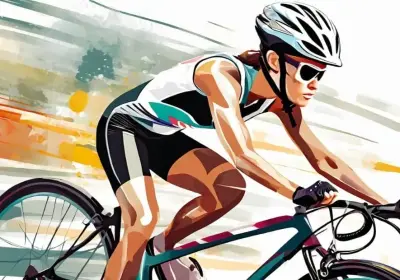


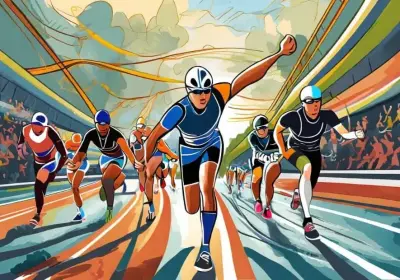
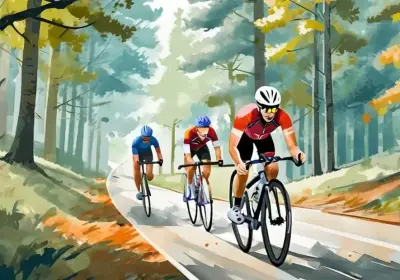
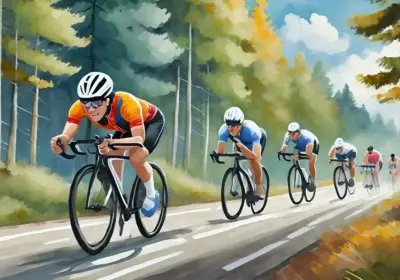
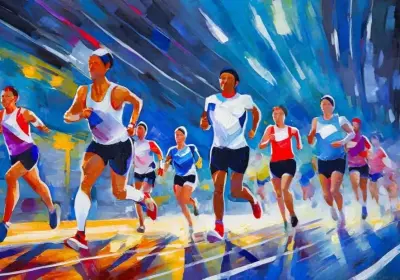

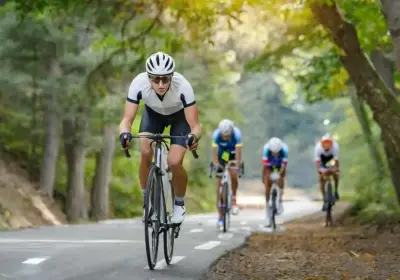

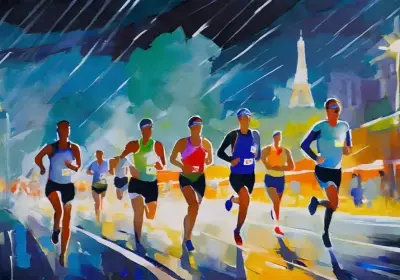

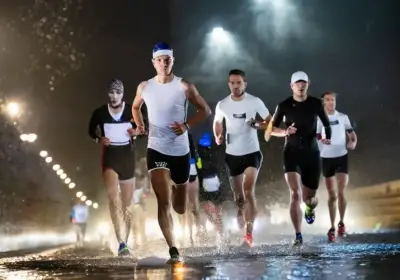
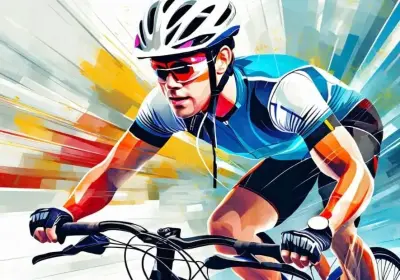
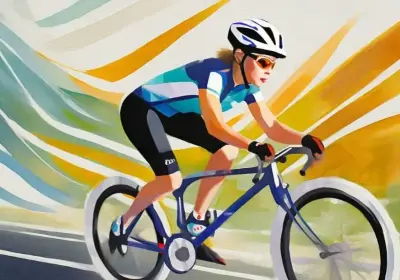
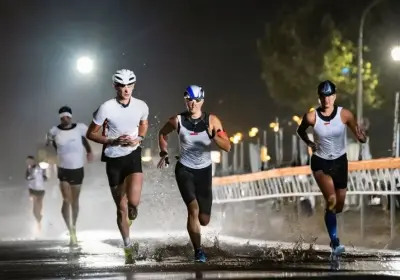

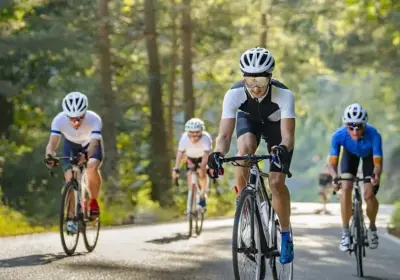
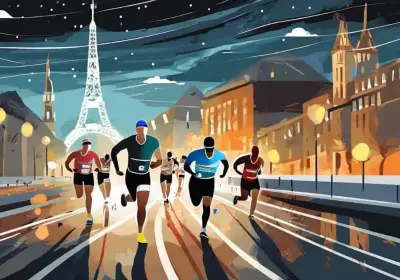

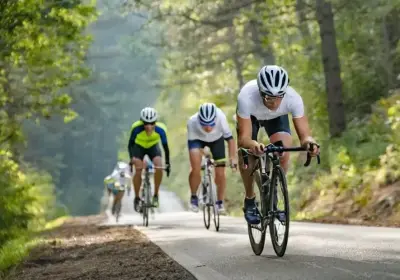
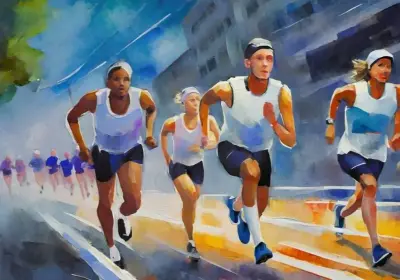
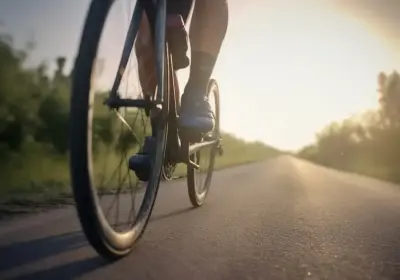
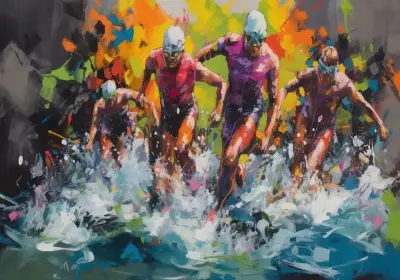
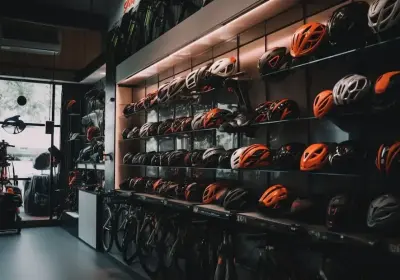
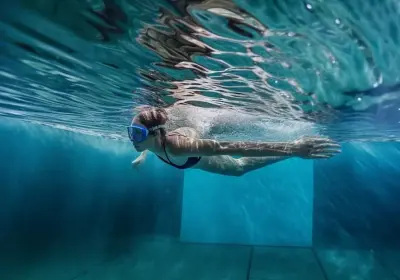
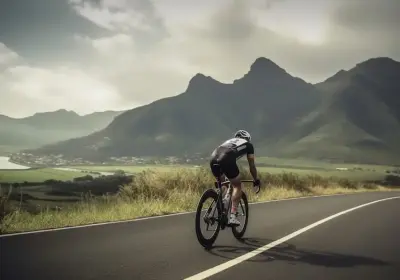
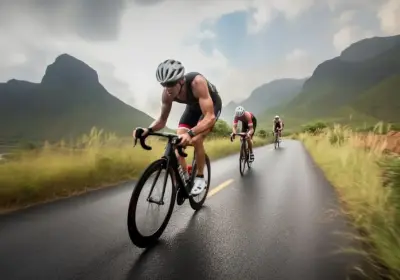








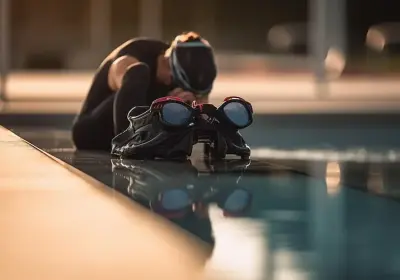
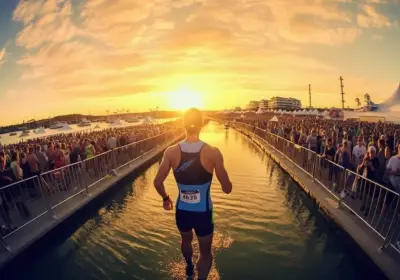

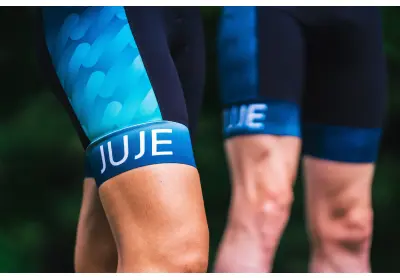

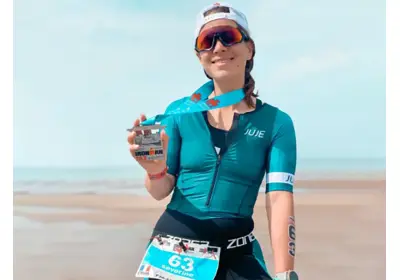




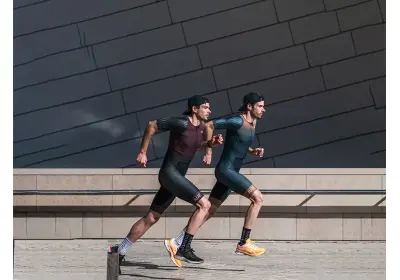
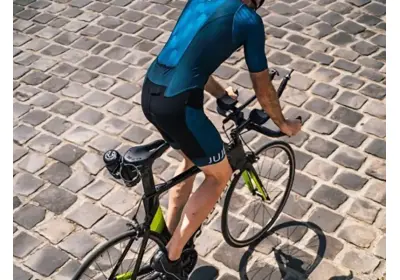
Leave a comment